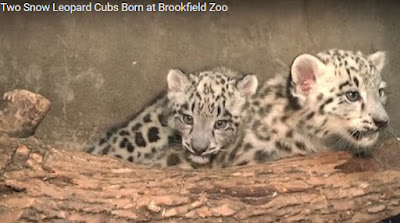National Dog Day was August 26th. (click here)
August 30, 2015
By Earth Touch
National Dog Day (click here) in the US is behind us, which means it's time to turn our attention back to the internet's favourite: felines! Staff at Chicago's Brookfield Zoo are happy to announce the birth of two female snow leopard cubs. The tiny furballs weigh in at just ten pounds (4.5kg) and are busy bonding with their mother in a behind the scenes enclosure.
With an estimated 4,000-6,000 remaining in the wild, snow leopards (Panthera uncia) are listed as endangered by the IUCN, making this duo an exciting new arrival. "Their pairing was based on a recommendation from the Association of Zoos and Aquariums' Snow Leopard Species Survival Plan (SSP)," the zoo notes in a press release. "Each SSP manages the breeding of a species to maintain a healthy and self-sustaining population that is both genetically diverse and demographically stable."...
Snow leopards (click here) are facing a distinct threat from climate change. Their typical habitat range is between where the tree line stops and the snow line begins on the mountains. As climate change causes temperatures to ruse, snow lines are receding, which means that snow leopards must move further up the mountain slopes as well. As snow leopards get to higher elevations, the vegetation becomes more scarce, which means that the herbivores that they prey on are in limited supply as well, and the leopards are having trouble finding enough food.
Due to the high demand for their coats, snow leopards are also illegally hunted for the fur trade. The pelts are a sought-after commodity in places like Central Asia, Eastern Europe and Russia where they are turned into coats and other garments. Snow leopard bones and body parts are also used for traditional Asian medicine. As humans expand their farm and grazing areas for livestock herds they are encroaching more into the snow leopards territories resulting in increased conflict with humans when snow leopards attack livestock during times when their natural prey is scarce....
August 30, 2015
By Earth Touch
National Dog Day (click here) in the US is behind us, which means it's time to turn our attention back to the internet's favourite: felines! Staff at Chicago's Brookfield Zoo are happy to announce the birth of two female snow leopard cubs. The tiny furballs weigh in at just ten pounds (4.5kg) and are busy bonding with their mother in a behind the scenes enclosure.
With an estimated 4,000-6,000 remaining in the wild, snow leopards (Panthera uncia) are listed as endangered by the IUCN, making this duo an exciting new arrival. "Their pairing was based on a recommendation from the Association of Zoos and Aquariums' Snow Leopard Species Survival Plan (SSP)," the zoo notes in a press release. "Each SSP manages the breeding of a species to maintain a healthy and self-sustaining population that is both genetically diverse and demographically stable."...
Snow leopards (click here) are facing a distinct threat from climate change. Their typical habitat range is between where the tree line stops and the snow line begins on the mountains. As climate change causes temperatures to ruse, snow lines are receding, which means that snow leopards must move further up the mountain slopes as well. As snow leopards get to higher elevations, the vegetation becomes more scarce, which means that the herbivores that they prey on are in limited supply as well, and the leopards are having trouble finding enough food.
Due to the high demand for their coats, snow leopards are also illegally hunted for the fur trade. The pelts are a sought-after commodity in places like Central Asia, Eastern Europe and Russia where they are turned into coats and other garments. Snow leopard bones and body parts are also used for traditional Asian medicine. As humans expand their farm and grazing areas for livestock herds they are encroaching more into the snow leopards territories resulting in increased conflict with humans when snow leopards attack livestock during times when their natural prey is scarce....
